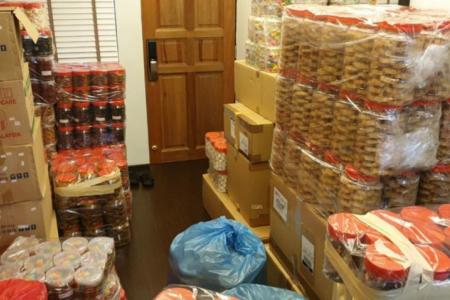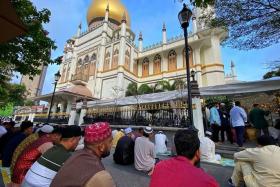Online platforms offer hope for displaced Ramadan vendors
Festive bazaars replaced by virtual marketplaces that offer a lifeline to those trying to clear their stock
For the past few weeks, Ms Roselin Khatoon's apartment has looked less like a home and more like a warehouse.
Bottles of cookies, packs of chips and other Hari Raya snacks she had planned to sell at a Ramadan bazaar are littered all over her three-room Housing Board flat, which feels like an obstacle course.
And with news last month that all bazaars would be cancelled, the quality assurance inspector at an engineering firm who is in her 50s was prepared to lose some of the $70,000 she had invested in the goods she had ordered.
But this might not be the case, thanks to new online bazaar platform B. Halal, one of several new platforms providing a channel for Muslim consumers to buy their Ramadan and Hari Raya goods.
To be launched today, the platform is an app-based listing of Hari Raya-centric businesses such as Ms Roselin's.
It is started by Web designer Muhammad Alkhatib and businessman Hamdan Razali, who have partnered veteran bazaar operator En Niche Events and event management company S-Lite Group to organise a virtual marketplace in the wake of the cancelled bazaars.
B. Halal is free for any business to join and will also feature a live-streamed variety show hosted by top celebrities that businesses can pay to be featured on.
The shows will be streamed twice a week during the fasting month. The first day of fasting is on Friday and Hari Raya Puasa will be celebrated on May 24.
Ms Roselin, founder of #IceboxCookies, which is her festive snack business that has been around for more than three years, said of the platform: "Hopefully with this, I can clear the stock I have, I have accepted what has happened already but this B. Halal is the best I can do now, and I hope people will want to buy my kueh online."
On March 18, the People's Association (PA) said all the bazaars it usually organises will not be returning this year, in the light of the Covid-19 pandemic and the need to practise social distancing in public venues.
As part of Singapore's circuit breaker measures to curb the spread of the coronavirus, events such as the bazaars, which would see large numbers of people congregating, will not be allowed to take place. The bazaars are known for the wide variety of food, festive clothes and household decorations for shoppers.
Last Saturday, PA announced it had launched an e-commerce platform intended to replace the bazaar, which will include delivery to customers.
Called GeylangBazaar.Online, it will provide a service to collect goods from vendors who have signed on with PA, and arrange for the goods to be delivered.
Platforms such as B. Halal, with its free listing and variety show star power, are determined to stand out from the rest.
Mr Mustaffa Shah, founder of En Niche Events, said of B. Halal: "Many of these people who have signed up with us are bazaar regulars who have been in the bazaar business for the longest of times and are solely dependent on the Malay-Muslim market."
Another platform looking to stand out is Gobaza.sg, an online portal for merchants to sign up and be listed for free on its portal.
For those who are keen to be featured more prominently, Gobaza offers advertisement spaces for between $199 and $699. It went live on April 13 and has almost 50 merchants listed on it.
The app was started by Mr Khairul Yunos, 30, and his two partners, who are all co-founders of Hubreno, a social commerce app which developed Gobaza.
He told The Straits Times that besides merchants, community partners can also create accounts to upload their Ramadan projects like donation drives and distribution of necessities to needy beneficiaries.
"We hope that all those merchants who are affected by the cancellation of the bazaar this year can leverage us for their business using our platform," he said, adding that Gobaza will continue to be live even after Ramadan is over.
One such affected merchant is Mr Abdul Hakam Ibrahim, 31, who had planned to sell fried food in three different bazaars this year and had spent about $7,000 on dried goods.
When he heard about Gobaza's platform, he jumped at the chance to get his products listed to try and sell some to get income.
Also getting a slice of the e-bazaar pie is Miss Nurshahidah Ahmad, 26, who with two other partners created an Instagram page called bazaarrayasg2020.
The page, which currently has more than 3,000 followers, charges businesses between $30 and $50 to be on it. It launched last Friday and has featured more than 25 businesses.
Miss Nurshahidah said she is unfazed by the competition from other bigger platforms and that sellers need any kind of platform available to get their goods out.
Business owners such as Ms Zuliza Zulkifli of Nasi Ambeng Asli Jurong West agreed that having more platforms to reach out to more customers online is a good thing.
The 42-year-old has spent the past 12 years working in Ramadan bazaar stalls selling nasi ambeng.
Using platforms like Gobaza is a big change for her but she is determined to look on the bright side, such as not having to commute to the bazaars every day.
She is also glad that there is no rental fee to pay for a stall which, going by past years, can be as high as $14,000 a month.
"We do what we can to get by, and we can look forward to enjoying (the bazaar) next year," she added.
Get The New Paper on your phone with the free TNP app. Download from the Apple App Store or Google Play Store now



